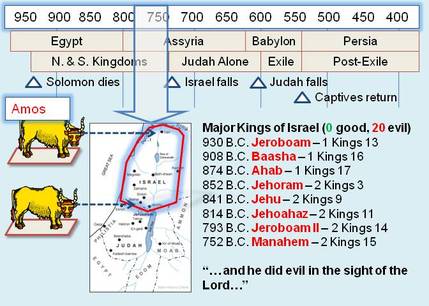A Survey of the Prophets - Amos
|
Historical Background of the Book. Around 760 B.C. (roughly the same time period when Jonah was sent to the distressed Assyrians), the Northern and Southern Kingdoms were enjoying relative peace and prosperity. Yet both kingdoms were experiencing social corruption, especially the Northern Kingdom of Israel that had never experienced the reign of a righteous king since its founding after the death of Solomon. Such is not too surprising since Jeroboam, the first king of Israel, had departed from the Law of Moses in a number of ways, including starting idol worship at the northern city of Dan and the southern city of Bethel (1 Kings 12:25-33).
The Author and the Audience. God chose a herdsman and farmer (Amos 7:14) from the small village of Tekoa about 15 miles south of Jerusalem. Amos was neither a priest nor the son of a prophet. Yet, God used him to deliver an important message, mainly to the Israelites in the Northern Kingdom (although other nations were included in the message). The setting of the message was Bethel, about 12 miles north of Jerusalem, and one of two centers of calf worship in the Northern Kingdom (1 Kings 12). |
Outline/Major Themes. The book of Amos is written in typical prophetic style with warnings of judgments to come:
Messages for Christians. In the book of Amos, we see echoes of several lessons for Christians:
- Ch. 1:1-2:5 Pending judgments on Israel's surrounding neighbors: Damascus to the north, the Philistines of Gaza to the southwest, the Phoenicians of Tyre to the west, Edom (remember Obadiah?), Ammon, Moab to the southeast, and Judah to the south.
- Ch. 2:6-16 Pending judgment on Israel
- Ch. 3:1-6:14 Sins of Israel and their impending judgment, destruction, and exile
- Ch. 7:1-9:10 Five visions of the coming judgment plus some interaction between Amos and Amaziah, one of the priests at Bethel
- Ch. 9:11-15 A glimpse of the Messiah's kingdom
Messages for Christians. In the book of Amos, we see echoes of several lessons for Christians:
- God is mighty (Ch. 4:13; 5:8-9).
- God requires obedience, regardless of nationality (Rom. 1:16; 2:9-11).
- Spiritual decay often follows material prosperity (Matt. 19:23-24; Luke 12:16ff; 1 Tim. 6:9-10, 17-19; Rev. 3:16-18).
- Worship does not cancel out evil deeds (Ch. 5:21-23 versus Ch. 5:10-12; Matt. 15:7-9; Matt. 23:13-36; James 1:19-27; James 2:14-26).
- You don't have to be a member of the "clergy class" to be a worker for God (Matt. 5:13-16; 1 Cor. 15:58).

